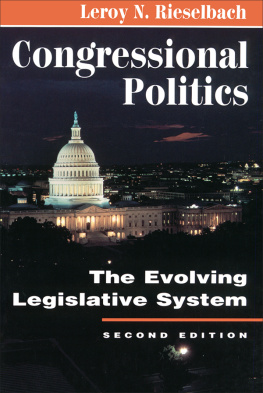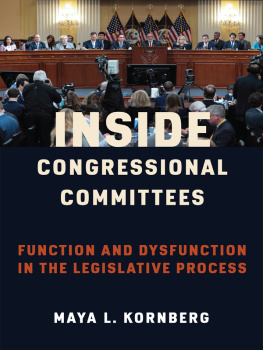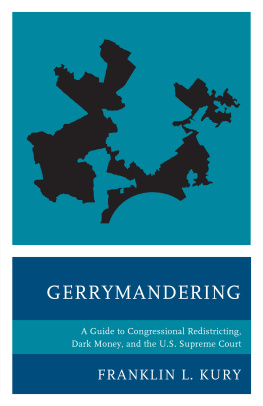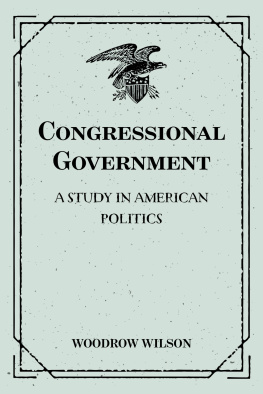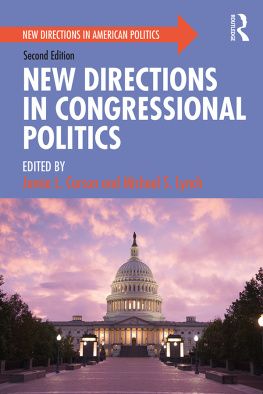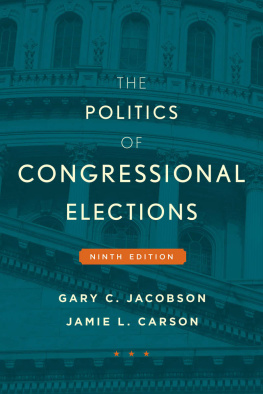Congressional Politics
TRANSFORMING AMERICAN POLITICS
Lawrence C. Dodd, Series Editor
Dramatic changes in political institutions and behavior over the past three decades have underscored the dynamic nature of American politics, confronting political scientists with a new and pressing intellectual agenda. The pioneering work of early postwar scholars, while laying a firm empirical foundation for contemporary scholarship, failed to consider how American politics might change or to recognize the forces that would make fundamental change inevitable. In reassessing the static interpretations fostered by these classic studies, political scientists are now examining the underlying dynamics that generate transformational change.
Transforming American Politics brings together texts and monographs that address four closely related aspects of change. A first concern is documenting and explaining recent changes in American politicsin institutions, processes, behavior, and policymaking. A second is reinterpreting classic studies and theories to provide a more accurate perspective on postwar politics. The series looks at historical change to identify recurring patterns of political transformation within and across the distinctive eras of American politics. Last and perhaps most importantly, the series presents new theories and interpretations that explain the dynamic processes at work and thus clarify the direction of contemporary politics. All of the books focus on the central theme of transformationtransformation in both the conduct of American politics and in the way we study and understand its many aspects.
FORTHCOMING TITLES
Unified Gridlock, David Brady and Craig Volden
Broken Contract? Changing Relationships Between Citizens and Their Government in the United States, edited by Stephen C. Craig
Congress and the Administrative State, Second Edition, Lawrence C. Dodd and Richard L. Schott
Governing Partners: State-Local Relations in the United States, Russell L. Hanson
The New American Politics: Reflections on Political Change and the Clinton Administration, edited by Bryan D. Jones
Young Versus Old: Generational Gaps in Political Participation and Policy Preferences, Susan MacManus and Suzanne L. Parker
Cold War Politics, John Kenneth White
Transforming American Politics
First edition published in 1973 by McGraw-Hill, Inc.
Published 1995 by Westview Press
Published 2018 by Routledge
711 Third Avenue, New York, NY 10017, USA
2 Park Square, Milton Park, Abingdon, Oxon OX14 4RN
Routledge is an imprint of the Taylor & Francis Group, an informa business
All rights reserved. No part of this book may be reprinted or reproduced or utilised in any form or by any electronic, mechanical, or other means, now known or hereafter invented, including photocopying and recording, or in any information storage or retrieval system, without permission in writing from the publishers.
Notice:
Product or corporate names may be trademarks or registered trademarks, and are used only for identification and explanation without intent to infringe.
Rieselbach, Leroy N.
Congressional politics: the evolving legislative system / Leroy N. Rieselbach. 2nd ed.
p. cm. (Transforming American politics)
Includes bibliographical references and index.
ISBN 0-8133-2399-1. ISBN 0-8133-2458-0 (pbk.)
1. United States. Congress. 2. United StatesPolitics and government. I. Title. II. Series.
JK1061.R48 1995
328.73dc20
94-38589
CIP
Isbn 13: 978-0-8133-2458-6 (pbk)
Tables and Figures
Tables
Figures
To my family,
all four generations,
who got me started and keep me going,
and
To the many students,
graduate and undergraduate,
whose interest in Congress has stimulated
me to keep thinking, talking, and
writing about the subject
Anyone who believes Congress is a static, unchanging institution should try to prepare a new edition of a textbook on the heels of the landmark 1994 midterm electionsespecially a text originally written and published more than twenty years ago. To be sure, the chapter titles, indicating the basic contours of the legislature, remain the same. Senators and representatives still come to Washington as representatives of states and single-member congressional districts. They still work primarily within committees, constrained by the formal rules of procedure and informal understandings (norms) about the ways Congress should conduct its business. They continue to vow allegiance to the Republican and Democratic political parties. They must, as always, contend continuously with the president and a vast array of political interest groups and less constantly with the courts and public opinion. On the surface, then, there is considerable continuity in the appearance of Congress.
Within these old bottles, however, there is much new wine. Contemporary Congress-bashers claim the legislature is out of touch, insensitive to change in the larger society outside the Washington Beltway, but nothing could be further from the truth. In fact, Congress is in a constant state of flux, reacting to a host of external (as well as internal) forces. The members who win election to Congress in the 1990s do so in dramatically different fashion from their predecessors and so differ substantially in outlook and the ways they perform their legislative chores. They work within altered committee arrangements, revised rules of procedure, and evolving congressional customs. They must confront new presidents, now Bill Clinton, and new administrations with new policy agendas; a vastly enlarged and increasingly vigorous set of interest groups; and a public more cynical than ever before about Congress* capacity to meet its responsibilities. Examples of these recent developments dot the pages and endnotes of the chapters that follow. The lawmakers, in short, adapt to changing conditions as their tenures proceed, and as they do, they transform the Congress.
A set of theoretical and organizational notions, the systems/role perspective, is particularly well suited to capture the complexity and dynamism of congressional politics and legislative change. Systems/role analysis posits that members behavior is best understood in terms of their personal attributes and experiences and their attitudes (role orientations) toward aspects of Congress itself (the system) and toward other political participants (in the environment) with whom they share authority. They must relate to the voters on whom they rely for election to office. As members of the congressional systemof which they and their supporting staff and ancillary agencies are the constituent elementsthey must decide in what ways to adapt to the organizational featurescommittees, parties, rules of procedure, and unwritten normsthat characterize the legislative institution.
In addition, the women and men of Congress need to deal with those beyond the legislative hallsconstituents, interest groups, executive-branch actors, and judgeswhose support they seek to win. Finally, senators and members of the House have to allocate their time, energy, and efforts among the lawmaking, representational, and oversight activities that make up the legislative workload. The legislative role thus consists of the orientations that members hold toward Congress and political actors outside the system. The lawmakers will, in any given decisionmaking situation, encounter role conflict; they will be unable simultaneously to act consistently with all the role orientations they hold. Decisions of the Congress, the systems/role outlook suggests, should reflect the pattern and strength of the members orientations.

